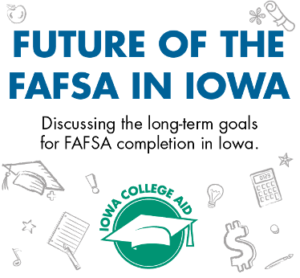In early 2021, staffers at Iowa College Aid planned a series of virtual convenings to elicit a range of perspectives and strategies on raising statewide FAFSA completion rates. The planning team mapped out various stakeholder groups, scheduled 13 separate convenings, and delved into the details of creating and staffing dozens of virtual breakout rooms.
Supporting FAFSA completion has been a key goal of Iowa College Aid’s programming for several years. In recent months though, it became clear that additional work was needed to offset falling completion rates — a trend that was amplified by the COVID-19 pandemic. Iowa College Aid and other postsecondary stakeholders watched closely as other states moved toward legislation requiring FAFSA completion. Would this approach work for Iowans?
We decided to find out.
Several key considerations underpinned the work of the planning team as meetings began this past February. The importance of language became clear: “mandatory” or “required” FAFSA completion seemed destined to generate pushback. The team eventually settled on “universal FAFSA completion” as the preferred language. Another critical planning decision was on how to frame the convening invitations and, subsequently, breakout room discussion prompts. Instead of focusing on the question of pursuing “universal FAFSA” as a policy, the convenings were presented as an opportunity to discuss the future of FAFSA in Iowa and to generate conversation on ways to increase completion.
The planning team turned to stakeholder groups. Crucially, the team included a wide range of perspectives. School counselors, representatives from Iowa’s Local College Access Networks, postsecondary education staff, financial aid staff and current students were included.
The convenings kicked off in April and continued through June. In terms of process, each convening generally followed a similar format. Iowa College Aid staff provided a brief presentation on FAFSA completion trends in Iowa, efforts underway to support completion rates and an overview of other states’ efforts to increase completion, including mandates. Next, attendees were invited to join breakout rooms for facilitated conversations to share opinions on potential strategies for increasing FAFSA completion.
The logistics of the breakout rooms were carefully considered. The planning team determined that participants could feel inclined to speak more freely if the convenings were not recorded. As a result, each breakout room was staffed by both a facilitator, to guide the conversation, and a note taker, who paraphrased participants’ feedback in real time. Facilitators were provided a consistent set of conversation prompts, and trainings were held for both facilitators and note takers.
Following the convenings, we reviewed discussions to evaluate the process and capture lessons learned. Planning and executing the convenings proved to be a significant lift for staff on top of their regular duties, but the team generally agreed on the great value of engaging with a wide range of stakeholders on FAFSA completion. It also became clear to staff that the stakeholder groups genuinely appreciated the opportunity to share their perspectives on the prospect of universal FAFSA.
Iowa College Aid staff analyzed the data captured in the convening breakout rooms and published key findings and policy considerations. In general, we found that stakeholders agree that Iowa needs to put more funding and resources toward FAFSA completion to move the needle. Stay tuned for the next post in this series to learn how state leaders can center equity in FAFSA completion policies.





